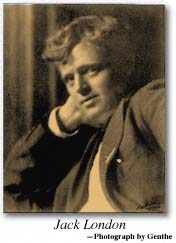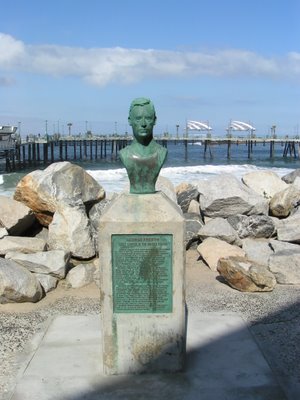 In 1907, legendary author Jack London traveled to Hawaii and gazed out into the ocean to marvel at what would one day become a common sight in Redondo Beach. In an article published in the Ladies Home Journal that year he explained the encounter with the enchanting description that follows:
In 1907, legendary author Jack London traveled to Hawaii and gazed out into the ocean to marvel at what would one day become a common sight in Redondo Beach. In an article published in the Ladies Home Journal that year he explained the encounter with the enchanting description that follows:  “Where but the moment before was only the wide desolation and invincible roar, is now a man, erect, full statured, not struggling frantically in that wild movement, not buried and crushed and buffeted by those mighty monsters, but standing above them all, calm and superb, poised on the giddy summit, his feet buried in the churning foam, the salt smoke rising to his knees, and all the rest of him in the free air and flashing sunlight, and he is flying through the air, flying forward, flying fast as the surge on which he stands. He is a Mercury - a brown Mercury. His heels are winged, and in them is the swiftness of the sea,” wrote London.
“Where but the moment before was only the wide desolation and invincible roar, is now a man, erect, full statured, not struggling frantically in that wild movement, not buried and crushed and buffeted by those mighty monsters, but standing above them all, calm and superb, poised on the giddy summit, his feet buried in the churning foam, the salt smoke rising to his knees, and all the rest of him in the free air and flashing sunlight, and he is flying through the air, flying forward, flying fast as the surge on which he stands. He is a Mercury - a brown Mercury. His heels are winged, and in them is the swiftness of the sea,” wrote London.The man, the “brown Mercury,” London was writing about was Redondo Beach legend George Freeth.
This year marks the centennial anniversary of the sport of surfing brought to the area by Freeth, and the Redondo Beach City Council is looking to commemorate the city's place in this legacy by renaming a street “George Freeth Way.” At its first meeting of the year on Tuesday, the council unanimously agreed to pursue the idea, but referred the project to staff to flesh out the specifics of what manner and where it would be located.
“He made his home in Redondo Beach and he made his name in Redondo Beach,” said Arthur Verge, an El Camino Community College professor and Freeth biographer. “He (surfed) in Venice, and he did it in Santa Monica, but his home was Redondo.”
Above we see the bust of George Freeth which is on display at the Redondo Beach Pier.
No comments:
Post a Comment